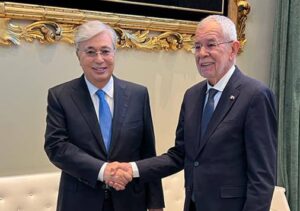ASTANA – Ambassador of Austria to Kazakhstan Willy Kempel shared insightful perspectives on the evolving dynamics of bilateral relations and new avenues of cooperation between Kazakhstan and Austria in an interview with The Astana Times.

Willy Kempel also stressed the flourishing educational and cultural exchanges that underscore the deepening ties between Austria and Kazakhstan. Photo credit: Aruzhan Ualikhanova/ The Astana Times
Emphasizing the depth of political alignment and mutual respect between the two nations, the ambassador highlighted the significance of upcoming diplomatic visits, notably that of Kazakhstan’s Deputy Prime Minister and Foreign Minister Murat Nurtleu to Austria on March 14-15.
“We have a lot in common. We are looking at bilateral relations, first of all, in political terms. I think we are very close to each other in a lot of positions worldwide. We have cordial, intensive relations. I think we will look now for a bit more exchange of visits. That is why I am very happy that Minister Nurtleu is coming to Austria,” said the ambassador.

Kassym-Jomart Tokayev and President of Austria Alexander Van der Bellen on the sidelines of the 77th UN General Assembly in September 2022 in New York. Photo credit: Akorda
Cooperation on a multilateral level is also growing, he added.
“We are also very much engaged in the United Nations, the Organization for Security and Co-operation in Europe [OSCE], and other international organizations. We compare notes, and we work together,” he said.
First encounter with Kazakhstan
Kempel has been serving in Kazakhstan since September 2020. Concurrently, he is also the ambassador to the Kyrgyz Republic and Tajikistan.
Reflecting on his personal encounter with Kazakhstan, he said it dates back to his days in the European Commission.
“By coincidence, when I was working in the European Commission in Belgium, a close colleague of mine in the same department was married to a Kazakh lady. Therefore, I was exposed to Kazakhstan in Brussels years and years ago,” he said.
Before Kazakhstan, he worked as an ambassador in Qatar. His appointment to Kazakhstan came under complicated circumstances.
“When I learned I would come to Kazakhstan. I think the first approach was I am coming under Covid to another country in Covid. It was difficult to say goodbye under Covid restrictions, and it was even more difficult to say hello under Covid restrictions. Nevertheless, I managed and found open doors with a mask,” he said.
He also recalled the tragic events in Kazakhstan in January 2022, widespread protests and demonstrations in the country.
Despite the challenges posed by the Covid-19 pandemic and the January events in Kazakhstan, the ambassador emphasizes the country’s resilience and commitment to reforms, particularly the national development plan until 2029, which Austria is keen to support.
“It is a very good basis to bring forward not only for Kazakhstan itself but also to work with friends, partners and allies and we would see ourselves as a friend, partner and ally,” said Kempel.
Trade and economic cooperation
Kempel proudly noted the remarkable growth in trade between the countries last year.

The Astana Times Senior Editor Assel Satubaldina and Ambassador Kempel during the interview. Photo credit: Aruzhan Ualikhanova/ The Astana Times
According to data from the Bureau of National Statistics, in 2022, bilateral trade stood at $209 million, of which $198 million were Kazakh imports. In 2023, trade rose to $332.6 million, with Kazakh imports at $322.9 million and exports at just $9.7 million.
“I think it is also a very good sign of where to go forward. On both sides, it is a win-win,” he said. “Both countries have a very firm economic environment, and both countries are looking forward to increasing it.”
Highlighting three strategic approaches – bilateral trade missions, economic commissions, and European Union (EU) partnership programs – Kempel stressed the importance of direct engagement and collaboration to overcome challenges and seize opportunities in the machinery, agriculture, and tourism sectors.
“Second, we have a bilateral economic commission that meets every two years. The next meeting is expected in Kazakhstan in the autumn of this year. The third one is within the framework of the European Union. With our partner countries in the European Union, we have trade missions. The next one will be in May, an agricultural mission, mostly on food, and we also expect Austrian companies coming along,” he said.
Promising avenues for cooperation
Kempel stressed Kazakhstan remains Austria’s largest crude oil supplier, with transactions reaching 1.6 billion euros ($1.75 billion) last year. This underscores Kazakhstan’s strategic importance to Austria’s energy security and economic stability.
The sectors at the forefront of bilateral relations also include machinery, agriculture, and tourism, with both nations looking to expand these interactions further.
“We are engaged with Kazakhstan’s Association of Machinery Industry. Also, the agricultural sector. Last autumn, we had a bilateral agricultural mission to Kazakhstan, which was very successful with follow-ups. Also, the tourism sector. As you know, we are also a tourism country with the hospitality industry. I think we can work together,” he said.

Cultural exchanges, though impacted by the COVID-19 pandemic, have seen a resilient return. Photo credit: Aruzhan Ualikhanova/ The Astana Times
Another project the ambassador mentioned is the provision of cable cars, ski lifts, an access control payment system and snowmaking machinery from Austria to Almaty’s Shymbulak resort.
Austria’s contribution to Kazakhstan’s infrastructure development is also exemplified by the construction technologies employed in Central Asia’s tallest building, the Abu Dhabi Plaza in Astana.
Looking ahead, both countries are keen on exploring new avenues for cooperation, with green steel manufacturing and carbon neutrality efforts at the forefront. These initiatives align with the global push towards sustainable development and echo Kazakhstan’s ambitions for achieving net-zero greenhouse gas emissions by 2060.
Kempel added that a commercial section of the Austrian embassy in Almaty facilitates direct engagement with Kazakhstan’s businesses.
Middle Corridor
Kempel noted that Austrian companies also work with Kazakhstan Temir Zholy national railway company on transport and the rollout of the Trans-Caspian International Transport Route (TITR), also known as the Middle Corridor. TITR is a multimodal corridor connecting China and Europe that passes through Kazakhstan.
“The Austrian railway company ÖBB has been here [in Kazakhstan] since 2008. Since then, there is an intense cooperation between the two sides,” he said.
On Feb. 21, Kazakh Ambassador to Austria Mukhtar Tileuberdi met with ÖBB CEO Andreas Matthä and Rail Cargo Group Executive Board Member Christoph Grasl. During this meeting, the Austrian executives reaffirmed their intention to expand their presence in Central Asia, including in the development of TITR.

Andreas Matthä, Ambassador Tileuberdi, Christoph Grasl. Photo credit: Kazakh Embassy to Austria
Ambassador Kempel emphasized the multi-faceted approach required to enhance the efficiency and reliability of this vital trade route.
“The first avenue to explore is how to make the corridor work efficiently from the Chinese border to, let’s say, Berlin or Vienna,” the ambassador said. This involves a comprehensive examination of the data, investments in train transport, and addressing security concerns and the condition of the rolling stock.
Highlighting the significance of seamless transitions in transport modes, he added that overcoming bottlenecks at various junctures where the mode of transport changes is critical.
“You have bottlenecks from the train to the ship, from the ship to the train and again. So wherever you have to change the mode of transport, you have to make sure that it is going swiftly without too much paperwork,” he noted.
Border crossings, according to the ambassador, also need to be addressed to streamline the corridor.
“We know that border crossings can be two days and can be two weeks. This is one of the issues to look at. Customs declarations, customs duties, you can do a lot in electronic form, but you have to trust it. It is a cooperative mode,” said Kempel.
The ambassador also noted the distribution of goods within the EU, the role of shipping in the Caspian Sea, and the importance of establishing uniform tariff policies among Kazakhstan, Georgia and Azerbaijan.
“We are looking forward to those three countries coming to an understanding of one tariff because I think that the one tariff policy is an important one that everybody knows, along the whole route, for what kind of cargo what tariff will come,” he stated.
The conversation also touched on broader implications, including geopolitical tensions and environmental concerns. The current geopolitical landscape, such as those via the Red Sea, has implications for this corridor.
According to the Kazakh Ministry of Transport, the volume of traffic along TITR increased by 65% in 2023, reaching 2.76 million tons, up from 1.7 million tons in 2022. In 2024, Kazakhstan plans to increase the volume by another 43% to reach 4.2 million tons.
Sustainable development
Both Kazakhstan and Austria share common aspirations toward a low-carbon future. The ambassador highlighted the significant strides Austria has made in leveraging renewable energy sources, with more than two-thirds of its energy supply deriving from non-carbon sources such as hydro, wind, and solar power.
He delved into environmental initiatives, particularly in the fields of renewable energy technologies, air pollution, water treatment, and waste management. Austria’s leadership in these areas was stressed as crucial for countries such as Kazakhstan, which is looking to modernize its infrastructure.
“We offer renewable energy technologies and clean air pollution control. We are also leaders in water treatment and waste treatment, and waste separation is also a key area for Kazakhstan to look into,” said the Austrian diplomat.
The cooperation extends into Central Asia, where Austrian companies are engaged in projects aimed at enhancing regional water management and hydropower capabilities.

Beyond his diplomatic work, Kempel is an artist. According to him, one’s personality has multifaceted layers, and his artwork contributes to his diplomatic career as yet another channel of communication with people. Photo credit: Aruzhan Ualikhanova/ The Astana Times
Looking ahead, the ambassador expressed enthusiasm for Kazakhstan’s ongoing chairmanship of the International Fund for Saving the Aral Sea (IFAS) in 2024. IFAS is an organization committed to addressing the ecological crisis and improving the socio-economic conditions in the Aral Sea basin.
“As you know, IFAS is not only about the Aral Sea but also regional energy and water management that is already in the statute of the organization. Therefore, we are looking forward to bringing this forward,” he added.
Beyond water and energy, the ambassador touched on the broader environmental challenges such as forest fires and the need for adaptive forestry practices in the face of climate change. “We can learn from each other a lot. We will have the next EU-Kazakhstan business platform at the beginning of April. We will look together, EU and Kazakhstan, on issues related to agriculture, water, forestry, especially also the exchange – what we can learn from each other,” he added.
EU engagement with Kazakhstan
Kempel stressed Kazakhstan was the first country in Central Asia to sign the Enhanced Partnership and Cooperation Agreement (EPCA), the so-called second-generation agreement.
The ambassador mentioned a pivotal meeting in Luxembourg in October 2023, which convened the foreign ministers of Central Asia and the EU. A robust program was unveiled, encompassing an ambitious roadmap with 72 actions aimed at fostering mutual development and cooperation.
The partnership also extends to critical areas such as energy, climate, and water management. Recognizing the acute impact of climate change on Central Asia, particularly Kazakhstan, the EU and Kazakhstan have embarked on a partnership program to address these challenges.
“We also have a European Union partnership program on energy, climate, and water. I think this is very important for Kazakhstan. If I understand correctly from scientific reports, climate change will affect Central Asia very much,” he said.
The program prioritizes water resource management, energy sustainability, air pollution mitigation, and waste management, acknowledging the region’s significant environmental vulnerabilities.
